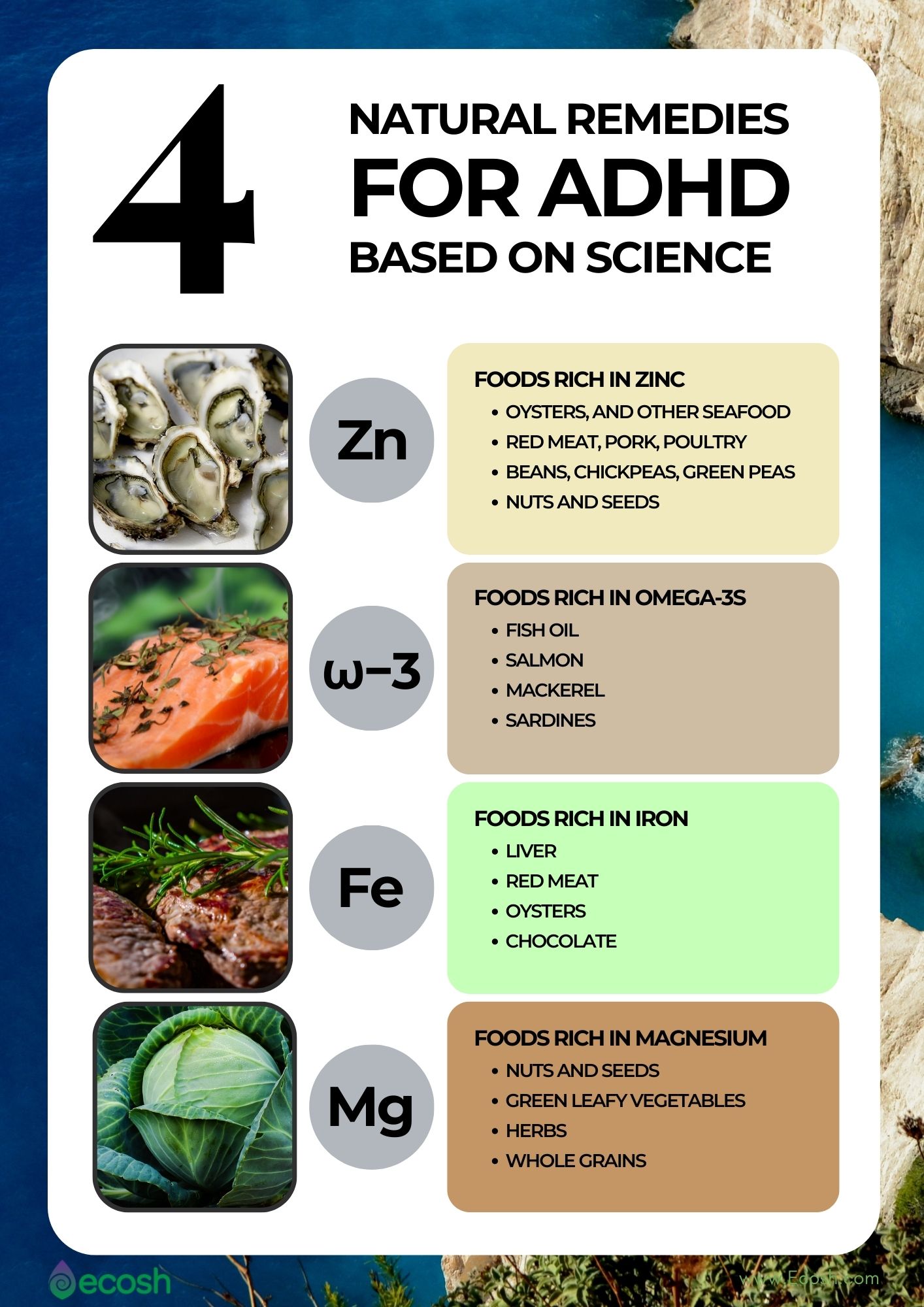The prevalence of attention deficit hyperactivity disorder (ADHD) in children and adolescents is globally on average 5 percent, and among adults, between 2,58 percent (persistent adult ADHD) and 6,76 percent (symptomatic adult ADHD).
This neurodevelopmental disorder is one of the most often diagnosed childhood psychiatric disorders that starts in childhood and may persist into adolescence and adulthood.
Due to the fact that many adolescents and adults with the disorder demonstrate antisocial behavior as well as criminal actions, ADHD has been growingly considered a serious social issue.
The first-line medications in the treatment of ADHD are stimulants. Though adolescents and adults with ADHD have a higher risk of substance abuse, and substance use disorder is one of the most frequent coexisting psychiatric disorders among this group of patients. Other unwanted side effects of taking stimulants may include insomnia, cardiovascular issues, appetite loss, hypoevolutism (retarded development), gastrointestinal problems, and tics.
ADHD Risk Factors
Likelihood of having ADHD may grow in case of:
- Having blood relatives with ADHD. For example, having parent or sibling, with ADHD or some other mental health disorder
- Substance misuse during pregnancy. For instance if your mother used drugs, smoked or drank alcohol during pregnancy.
- Environmental toxins. For example, if you were exposed to environmental toxins (like lead that is found mostly in pipes in older buildings and paint) as a child.
- Premature birth. Children who are born prematurely have a higher risk of ADHD.
ADHD Complications
Attention deficit hyperactivity disorder has been associated with:
- Deficient self-image
- Problems with mental and physical health
- Difficulties with school or work performance
- Problems with obeying the law
- Unemployment
- Financial issues
- Substance or alcohol misuse
- Recurrent accidents (for example car accidents)
- Problems with keeping relationships stable
- Suicide attempts (2).
Related Conditions in Children and Teenagers With ADHD
Sometimes, some conditions or problems may accompany with ADHD in children and teenagers, such as:
- Mood disorders, such as depression, bipolar disorder or some other mood disorder.
- Anxiety disorder
- Other psychiatric disorders, such as personality disorders, intermittent explosive disorder and substance use disorders.
- Personality disorders
- Problems with sleep
- Autistic spectrum disorder (ASD)
- Oppositional defiant disorder (ODD)
- Conduct disorder
- Dyspraxia
- Epilepsy
- Tourette’s syndrome
- Difficulties with learning, such as dyslexia (2, 3).
4 Natural Remedies For ADHD – Foods, Vitamins, Minerals And Other Supplements For ADHD
1. Zinc For ADHD Symptoms
Several studies propose that kids with ADHD may have decreased levels of zinc in their body. Therefore, some scientist suspect that there is a link between zinc deficiency and the severity of ADHD symptoms. According to some studies, children who took zinc supplements together with traditional ADHD treatment had an improvement in their symptoms. The only question what needs further investigation is the proper dosage of zinc in case of ADHD.
On the other hand, several other studies have demonstrated that there is a drop in symptoms like hyperactivity and impulsivity after taking zinc supplements, but no notable changes in inattentiveness, which is also one of the key symptoms of ADHD (4, 5, 6, 7).
Before supplementing, it is always better to first consult your doctor and measure the blood zinc levels, but according to S. Newmark it is safe to give your child 20-25 mg of zinc daily (10).
That said, eating more foods rich in zinc every day might be beneficial for children with ADHD, as it might lessen their symptoms.
Foods Rich In Zinc
- Oysters, crab, lobster and other seafood
- Red meat
- Pork
- Poultry
- Dairy products and cheese
- Baked beans
- Chickpeas
- Green peas
- Nuts, almonds and pumpkin seeds
- Whole grains
- Fortified cereals (4)
2. Omega-3 Rich Fish Oil For ADHD
It is noted that kids with ADHD have on average 38 percent lower blood levels of omega-3s than kids without the disorder. Fish oil contains omega-3 fatty acids, and there is quite sufficient evidence that omega-3 rich fish oil fish oil may help improve ADHD symptoms.
For example, children with ADHD who took omega 3 supplements every day for 4 months had less hyperactivity, inattention, disobedience, and hostility. In addition, taking omega-3 supplements improved their memory, spelling and learning.
What’s more, omega-3s may help kids with ADHD sleep better, and therefore be less fatigued during the day. Children who took omega-3s also improved their cooperating skills with others.
To understand more about omega-3 fatty acids such as DHA, EPA and ALA read the article about omega-3 fatty acids and their amazing health benefits (4, 8).
Sandy Newmark, M.D from ADDitude ADHD Medical Review Panel suggests a total dosage of:
- 1,000 mg of EPA plus DHA (add the two together) for smaller children,
- 2,000 mg for adolescents,
- and 1,500 mg for those in between.
Note, that there should be 1.5 to 2 times as much EPA as DHA (10).
Foods High In Omega-3s
- Salmon (3 ounces (oz) or 85 grams (g) of farmed salmon) -DHA: 1.24 g; EPA: 0.59
- Mackerel (3 ounces (oz) or 85 grams (g)) – DHA: 0.59 g; EPA: 0.43 g
- Trout (3 ounces (oz) or 85 grams (g)) – DHA: 0.44 g; EPA: 0.40 g
- Sardines (3 ounces (oz) or 85 grams (g)) – DHA: 0.74 g; EPA: 0.45 g
- Seabass (3 ounces (oz) or 85 grams (g)) – DHA: 0.47 g; EPA: 0.18 g
- Oysters (3 ounces (oz) or 85 grams (g)) – ALA: 0.14 g of; DHA: 0.23 g; EPA: 0.30 g
- Shrimp (3 ounces (oz) or 85 grams (g)) – DHA: 0.12 g; EPA: 0.12 g
- Chia seeds (1 ounce (oz) or 28 grams (g)) – ALA: 5.055 g
- Flaxseeds (1 tablespoon (tbsp)) – ALA: 6.703 g
- Hemp seeds (3 tablespoons (tbsp)) – ALA: 2.605 g
- Walnuts (1 cup) – ALA: 3.346 g
- Soybean oil (1 tablespoon (tbsp)) – ALA: 0.923 g
- Kidney beans (half cup) – ALA: 0,10 g
- Also, cod liver oil, albacore tuna, and herring contain high amounts of omega-3s (8, 9).
3. Iron For ADHD
According to some studies children with the disorder may have low levels of iron. Iron though is vital for normal brain function. Therefore, some believe that supplementing with iron may lessen symptoms of ADHD. Though that hasn’t been proven.
However, as taking too much iron can be toxic (even deadly) it is important to first measure the iron blood levels (hemoglobin, hematocrit and especially ferritin that is usually low in children with the disorder (22 in contrast to 44 in children without the disorder), so consult with your doctor before giving any iron supplements to your child.
S. Newmark suggests supplementing with iron if the ferritin level is less than 30, and first use 30-40 mg of elemental iron a day. Then measure the level of ferritin again in 3 to 6 months (4, 10).
However, your child eats foods high in iron you should monitor that the upper level of safe iron is not exceeded.
Foods Rich In Iron
- Organ meats, especially liver (however, some recommend to avoid liver during pregnancy).
- Red meat.
- Cooked oysters.
- Dark chocolate.
- Nuts.
- Dried fruit (for example, dried apricots and raisins).
- Beans (for example red kidney beans, white beans, edamame beans and chickpeas).
- Lentils.
- Spinach.
- Fortified breakfast cereals.
- Soybeans and soy bean flour (11).
4. Magnesium For ADHD
It is outlined that diet can play a notable role in the etiology of attention hyperactivity disorder, and the lack of magnesium can help to unfold hyperactivity in children. Although magnesium does not have a direct impact on improving attention, it may soothe hyperactivity and agitation, which both jeopardize attention.
Newman says it is safe for the child to take 100-300 mg of elemental magnesium twice a day. The magnesium can be in the form of glycinate, citrate, or chelate. However, he adds that the citrate form may lead to loose stools (10, 12).
Foods Rich In Magnesium
- Seeds and nuts, such as pumpkin seeds, chia seeds, sunflower seeds, sesame seeds, almonds, cashews, peanuts, peanut butter
- Herbs, such as basil, estragon, sage and coriander.
- Algae.
- Whole grains, like quinoa, buckwheat, whole grain or black bread (about 1000g per day), brown rice or whole wheat rice, oatmeal, fortified breakfast cereals
- Leafy vegetables and dark green vegetables, such as nettle, spinach, and zucchini.
- Beans, such as black beans, Edamame, Kidney beans (13).

Other Natural Supplements For ADHD
Ginkgo Biloba
Ginkgo biloba has been used to better functions related to cognition for centuries. Preparations made from this herb may relieve conditions like depression, autism, neuropsychiatric symptoms such as anxiety, as well as influence the cognitive and behavioral aspects of ADHD.
Therefore Ginkgo has been used also in the treatment of ADHD. The primary behavioral effects of Ginkgo biloba are calming, so this herb may improve irritation tolerance in people with the disorder. Ginkgo biloba may also promote willful cognition, attention and lessen irritability.
Although few small studies (one of these done with the combo of American ginseng and Ginkgo leaf) have shown that Ginkgo may be helpful in children with ADHD in improving attention, and ginkgo preparations are used in the treatment of ADHD – no systematic reviews on its safety or efficacy have been published (10, 14).
Therefore, as the evidence of its efficacy is open to more than one interpretation, before taking any preparations, first consult your doctor.
Melatonin
Although this natural hormone does not seem to help with ADHD symptoms, it may help relieve sleep problems in children with the disorder who take certain medications.
GABA
Although low levels of GABA are linked with ADHD, there is too little research on treating the disorder with GABA supplements.
Inositol
Inositol is a substance found in extremely small amounts in many foods. Some believe that in concentrated doses, it may help against agitation and anxiety. However, the efficacy and safety of inositol in the treatment of ADHD has not been proved.
Bacopa and gotu kola
These both belong to Ayurvedic medicine, and have been used in ADHD treatment, but there is still too little research on their efficacy and safety done in western medicine.
St. John’s wort
Despite the fact that St. John’s wort may affect brain chemicals, and is used to treat anxiety, sleep problems, and depression – researchers don’t suggest using it for ADHD treatment, as research has not shown effect on the symptoms of ADHD (4, 10, 14).
NB! The information provided here is for informational purposes only, so do not consider it as health care or medical diagnosis and treatment. Do not consider this information as a guarantee of the results you want to achieve. In addition, this information is not intended to replace the advice of your physician or other healthcare professional.
Even more, you should not use it to diagnose or treat a health problem. Before changing or discontinuing your existing medication, treatment, or care, or taking any dietary supplements, be sure to consult with your healthcare professional or doctor before starting any diet or program, or if you suspect you may have a medical condition.




